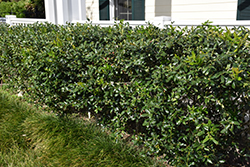It's all about ...
plants

Height: 15 feet
Spread: 15 feet
Sunlight:
![]()
![]()
Hardiness Zone: 8a
Other Names: Fine Line Chinese Holly, Horned Holly
Description:
An attractive, upright pyramidal selection presenting glossy green leaves with spiny tips and thin, golden margins; showy red fruits in fall to winter if pollinated by male variety; great for screening, or as a prominent landscape accent
Ornamental Features
Fineline Holly is primarily grown for its highly ornamental fruit. It features an abundance of magnificent scarlet berries from mid fall to late winter. It has attractive dark green foliage edged in gold which emerges light green in spring. The glossy pointy leaves are highly ornamental and remain dark green throughout the winter.
Landscape Attributes
Fineline Holly is a multi-stemmed evergreen shrub with a distinctive and refined pyramidal form. Its average texture blends into the landscape, but can be balanced by one or two finer or coarser trees or shrubs for an effective composition.
This is a relatively low maintenance shrub, and is best pruned in late winter once the threat of extreme cold has passed. It is a good choice for attracting birds and bees to your yard, but is not particularly attractive to deer who tend to leave it alone in favor of tastier treats. Gardeners should be aware of the following characteristic(s) that may warrant special consideration;
- Insects
- Disease
- Spiny
Fineline Holly is recommended for the following landscape applications;
- Accent
- Mass Planting
- Hedges/Screening
- Naturalizing And Woodland Gardens
- Container Planting
Planting & Growing
Fineline Holly will grow to be about 15 feet tall at maturity, with a spread of 15 feet. It has a low canopy, and is suitable for planting under power lines. It grows at a medium rate, and under ideal conditions can be expected to live for 50 years or more. This is a dioecious species, meaning that individual plants are either male or female. Only the females will produce fruit, and a male variety of the same species is required nearby as a pollinator.
This shrub does best in full sun to partial shade. You may want to keep it away from hot, dry locations that receive direct afternoon sun or which get reflected sunlight, such as against the south side of a white wall. It does best in average to evenly moist conditions, but will not tolerate standing water. This plant should be periodically fertilized throughout the active growing season with a specially-formulated acidic fertilizer. It is particular about its soil conditions, with a strong preference for rich, acidic soils. It is somewhat tolerant of urban pollution, and will benefit from being planted in a relatively sheltered location. Consider applying a thick mulch around the root zone in winter to protect it in exposed locations or colder microclimates. This is a selected variety of a species not originally from North America, and parts of it are known to be toxic to humans and animals, so care should be exercised in planting it around children and pets.
Fineline Holly makes a fine choice for the outdoor landscape, but it is also well-suited for use in outdoor pots and containers. Its large size and upright habit of growth lend it for use as a solitary accent, or in a composition surrounded by smaller plants around the base and those that spill over the edges. It is even sizeable enough that it can be grown alone in a suitable container. Note that when grown in a container, it may not perform exactly as indicated on the tag - this is to be expected. Also note that when growing plants in outdoor containers and baskets, they may require more frequent waterings than they would in the yard or garden. Be aware that in our climate, most plants cannot be expected to survive the winter if left in containers outdoors, and this plant is no exception. Contact our experts for more information on how to protect it over the winter months.
This plant is not reliably hardy in our region, and certain restrictions may apply; contact the store for more information.
